When it comes to city passes and travel cards, it’s usually fairly easy to figure out whether they would be worth it for you or not. For things like the Paris Pass or London Pass, they have a list of the most popular attractions and how much they cost, right there for you to see. The Swiss Travel Pass, however, is shrouded in mystery, or at least it was until I spent several days tracking down all of the prices and benefits.
A great many of the visitors and commenters on my popular page about where to go in Switzerland on a short visit are wondering whether the Swiss Travel Pass is a good deal. Embarrassingly, I’ve always had to answer that I found the pass too confusing to confidently advise people on. Now that has all changed, after literally days of research.
Note: This article was last updated in February, 2024.
Disclosure: This is a reader-supported website and some of the links are affiliate links where a small commission is paid to help keep this site going, but the cost to visitors is the same. The Swiss Travel Pass seems quite expensive at first, so it felt like it might be hard to get your money’s worth out of it. As it turns out, it’s pretty easy to get good value, and it’ll be a good deal for many visitors.
New in 2024
Prices increased an average of 5.9% from 2023 on the Swiss Travel Passes, but the Half Fare Card remains at CHF120, which is where it’s been for many years. Train fares in the country increased by similar percentages so the value is basically unchanged. There were no other notable changes to service or the included attractions and train routes.
>>>Buy the Swiss Travel Pass online
Where to stay in Interlaken and the Lauterbrunnen Valley
Since most people reading this will be visiting the Interlaken area and I get so many questions about it, I decided to write a detailed guide on which area to stay in while visiting this area.
>>>Where to stay in Interlaken or the Lauterbrunnen Valley in Switzerland
I included many huge photos in that post so readers will be able to get a better idea of what each place looks like and they are worth a look by itself.
>>>Lucerne or Interlaken: Which to visit and how long to stay?
The article just above will help you decide on how long to spend in each of Switzerland’s two best tourist areas.
Are you 100% sure where you want to go in Switzerland? This should help
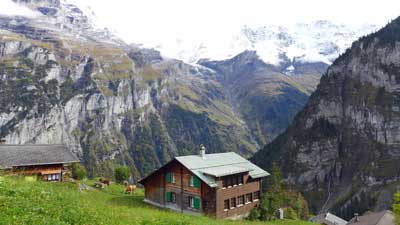
Zurich and Geneva are pleasant but dull. The good news is that Switzerland is packed with amazing sights and none of them are the big cities. If you aren’t 100% locked in yet, please read the article below and I think you’ll enjoy it.
Is the Swiss Travel Pass a good deal? Here's the short version

The bottom line is that the scenery, train journeys, and cable car rides in Switzerland are stunning and not found anywhere else in the world. They are also quite expensive if you pay for them one at a time. So no matter how you visit Switzerland, you are going to be paying quite a bit, or skipping the absolute best things that you’ve come there to see.
With good planning it’s quite easy to get great value out of a Swiss Travel Pass, but it might be a poor choice for those who don’t like to plan ahead. You can easily do a scenic train ride and a cable car in the same day, and still have time to do a scenic hike in the process.
First class or second class? Good news for most people
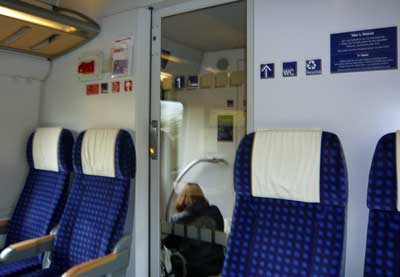
That said, Swiss Trains are literally the nicest in Europe and even the Second Class seats and carriages are nicer and roomier than trains in neighboring countries. The First Class seats are larger and nicer with only 3 across the cabin instead of 4, but honestly Second Class is perfectly comfortable for almost everyone.
Again, First Class on European trains like this is generally popular with business travelers where the company is paying and they need to get work done during the ride, and also senior citizens who don’t want to worry about a carriage full of backpackers. For most of the rest of us, Second Class is more than comfortable enough and the seat width and legroom compare to business-class airline seats. I’m a big and tall guy and I almost always travel in Second because it’s plenty comfortable enough and all the seats arrive at the same time anyway.
The longer you'll be in Switzerland, the better deal a Swiss Travel Pass will be
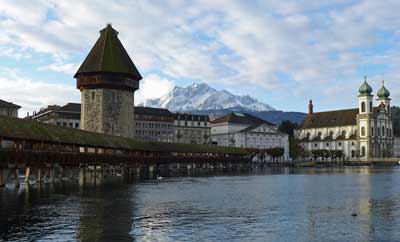
In other words, if you are staying 5 days or fewer, you have to do the math to determine your best option. But if you are spending even 6 or 7 days in Switzerland then the 6-day or 8-day Pass is almost guaranteed to be a great deal and your best choice. Once you have a Swiss Travel Pass you’ll absolutely love the ability to just hop on any train (excellent trains, always on time) and most boats and cable cars without having to worry about the cost. The per-day cost of an 8-day Pass even if you only use 6 of those days is about CHF65, and Switzerland is filled with amazing train rides and boats and cable cars that can get you that much value before noon each day.
Schilthorn (50% discount) and Jungfraujoch (25% discount) are cheaper with a Swiss Travel Pass
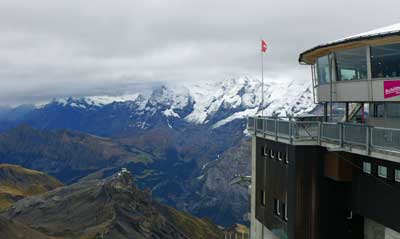
Both of those peak experiences are extraordinary and different from each other. Even so, compared to Jungfraujoch, Schilthorn is also faster and more comfortable on the way up and down. You can enjoy an excellent visit to Schilthorn in 4 hours or so (or a bit longer if you eat at the spinning Piz Gloria restaurant at the top), while a visit to Jungfraujoch requires closer to 6 hours.
NOTE: Schilthorn closes for maintenance for a week or two in late November most years.
Consider the Swiss Half-Fare Card instead
If you AREN’T going to be doing two or more of the long (and expensive) scenic train trips, you will get much better value out of the Swiss Half-Fare Card, which is explained a bit below.
Mt Rigi, near Lucerne, is 100% covered by the Swiss Travel Pass
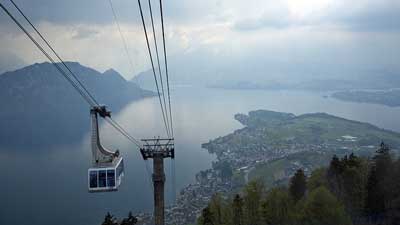
Is a Swiss Travel Pass right for you?
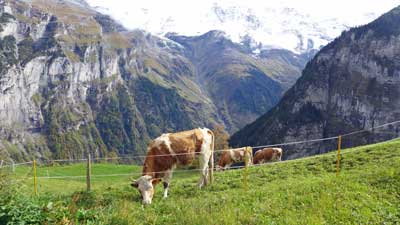
Most people only visit Switzerland for 5 or 6 days at most, so the 3-day and 4-day passes are the ones to focus on. But if you are staying for 8 days or more, those longer passes are almost certainly a great deal for you.
Long story short, if you plan on doing 2 of the more expensive scenic trains and the Jungfraujoch railway or the Schilthorn cable car, then the pass will save you money. Switzerland is expensive, but it’s worth it, and the travel pass can help make it a bit more affordable.
What the Swiss Travel Pass includes
- Free rail travel on normal trains and most scenic trains
- Discounted travel (about 50%) on popular tourist mountain trains
- Discounted travel (about 50%) on popular tourist cable cars
- Free travel on public transport in 75 towns and cities
- Free entry to around 500 museums in Switzerland
The Swiss Travel Pass covers the fare on the most popular scenic and panoramic trains. You can choose a normal seat in a regular carriage for no additional cost, but there is a supplement of CHF8 to CHF49 for a reserved seat in one of the special panorama carriages on these routes.
Prices of the 2024 Swiss Travel Pass
1st Class
- Adult 3-day Pass: CHF389
- Youth (4 to 25) 3-day Pass: 274
- Adult 4-day Pass: 469
- Youth (4 to 25) 4-day Pass: 330
- Adult 6-day Pass: 602
- Youth (4 to 25) 6-day Pass: 424
- Adult 8-day Pass: 655
- Youth (4 to 25) 8-day Pass: 469
- Adult 15-day Pass: 723
- Youth (4 to 25) 15-day Pass: 512
2nd Class
- Adult 3-day Pass: CHF244
- Youth (4 to 25) 3-day Pass: 172
- Adult 4-day Pass: 295
- Youth (16 to 25) 4-day Pass: 209
- Adult 6-day Pass: 379
- Youth (16 to 25) 6-day Pass: 268
- Adult 8-day Pass: 419
- Youth (16 to 25) 8-day Pass: 297
- Adult 15-day Pass: 459
- Youth (16 to 25) 15-day Pass: 328
Swiss Travel Pass Flex
This version costs a bit more, but you don’t have to use the travel days consecutively. It’s a great option for anyone who won’t be taking longer train rides each day.
- Adult 3 Flex days in 1 month (1st Class): CHF445
- Adult 3 Flex days in 1 month (2nd Class): 279
- Adult 4 Flex days in 1 month (1st Class): 539
- Adult 4 Flex days in 1 month (2nd Class): 339
- Adult 6 Flex days in 1 month (1st Class): 644
- Adult 6 Flex days in 1 month (2nd Class): 405
- Adult 8 Flex days in 1 month (1st Class): 697
- Adult 8 Flex days in 1 month (2nd Class): 439
- Adult 15 Flex days in 1 month (1st Class): 755
- Adult 15 Flex days in 1 month (2nd Class): 472
Where to buy the Swiss Travel Pass
The Swiss Half-Fare Card – A better option for many visitors
Far less confusing than the Swiss Travel Pass, you can instead get a Swiss Half-Fare Card, and it will be a better deal for many travelers. The price is lower and it’s much easier to do the math, and the discounts are greater on some things as well.
- Swiss Half-Fare Card for 30 days: Adults – CHF120 or US$129
What you get:
Those who buy the Swiss Half-Fare Card will get 50% discount on all trains, buses, and boats in Switzerland for up to 30 days, as well as 50% off all public transportation in 75 cities and towns.
>>>Buy the Swiss Half-Fare Card
Why the Half-Fare Card is a better deal for many
While the Swiss Travel Pass is a great deal for those doing many of the expensive scenic journeys and mountain sights within a few days, it’s not good value for those who are doing fewer of the expensive trips and/or those who are staying longer. Also, the Swiss Travel Pass only provides a 25% discount on the amazing Jungfraujoch Railway, which costs between CHF120 and CHF224 return depending on your starting point, while the Half-Fare Card provides a 50% discount.
The math is simple as well. You can just add up the cost of the trains, boats, and buses you’ll be taking while in Switzerland, and if the total is more than CHF240 or so, the Half-Fare Card will save you money.
Example itinerary:
- Zurich to Interlaken train (2nd Class): CHF50
- Schilthorn Cable Car: CHF112
- Jungfraujoch railway from Interlaken: CHF205
- Interlaken to Lucerne train (2nd Class): CHF33
- Mt Rigi roundtrip from Lucerne: CHF84
- Engelberg (near Lucerne) to Mt. Titlis Cable Car: CHF92
- Lucerne to Zurich train (2nd Class): CHF25
Total per person: CHF601
Total with Half-Fare Card (including price of card): CHF420.50
It would be tough to do all of those things in 4 days, although it is possible. If you bought a 4-day Swiss Travel Pass here is how it adds up:
4-Day Swiss Travel Pass: CHF259
Supplements for Schilthorn, Jungfraujoch, and Mt. Titlis: CHF203.25
Total cost: CHF462.25
Bottom line on the Swiss Half-Fare Card
Since the Half-Fare Card lasts 30 days and provides a larger discount on Jungfraujoch, it is better value for visitors who want to include that scenic top-of-Europe rail journey on their trip. The discounts also add up more quickly on Schilthorn and Mt. Titlis trips, just to name two examples, and you don’t have to take many longer rail journeys to get value out of the Half-Fare Card.
Swiss Saver Day Pass (A one-day unlimited travel pass)
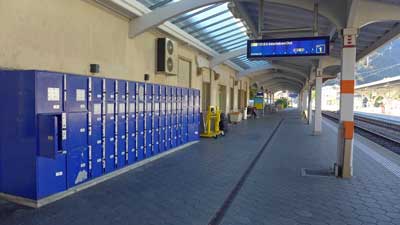
If you buy the Saver Day Pass at least 21 days in advance (and up to 60 days in advance) the 2023 cost is:
- 2nd Class (with Half Fare Card): CHF29
- 1st Class (with Half Fare Card): CHF82
- 2nd Class (with no Half Fare Card): CHF52
- 1st Class (with no Half Fare Card): CHF97
Once you research the normal cost of Swiss train fares you’ll see that the above prices are a very good deal for anyone riding more than 150 kilometers or so in a day. If you are just going, for example, from Zurich to Lucerne or Interlaken on a day, it’ll be cheaper to just buy that ticket individually. But if you are going from Geneva or Montreux to Interlaken or Lucerne then the Saver Day Pass will be much cheaper. Better still, you can use a Saver Day Pass to go from Interlaken to Geneva and back on the same day on the Goldenpass line and returning on the faster train through Bern, and it will still all be included for free.
If you don’t buy a Saver Day Pass at least 14 days in advance it’s more expensive, and if you only buy 1 to 3 days in advance it’s VERY expensive, so the key is to buy early. This is all confusing, but the Saver Day Pass should be a great option for many people only in Switzerland for one to three days.
Popular Swiss panorama scenic trains
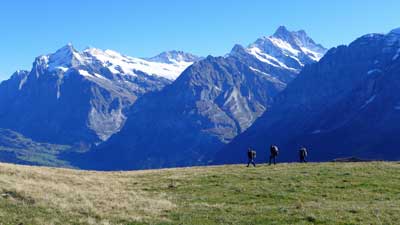
- Glacier Express
- Route: Zermatt to St. Moritz
- Train type: Panorama
- Journey time: 8 hours 3 minutes
- Distance: 291km
- 1st Class fare: CHF272
- 2nd Class fare: CHF159
- Compulsory seat reservation fee: CHF44 or 49
- Supplement for Swiss Pass holders: 13 to 33 for panorama carriage
- Bernina Express
- Route: Chur to Tirano and Lugano
- Train type: Panorama and bus
- Journey time: 4 hours 13 minutes and 3 hours 10 minutes
- Distance: 148km and 90km
- 1st Class fare: CHF113
- 2nd Class fare: CHF66
- Compulsory seat reservation fee: CHF32
- Supplement for Swiss Pass holders: 10 to 14 for panorama carriage
- GoldenPass Line
- Route: Lucerne to Montreaux
- Train type: Panorama
- Journey time: 5 hours 8 minutes
- Distance: 191 km
- Prestige Class fare: CHF131
- 1st Class fare: CHF96
- 2nd Class fare: CHF56
- Supplement for Swiss Pass holders: 8 to 15 for panorama carriage
- Gotthard Panorama Express (formerly Wilhelm Tell Express)
- Route: Lugano or Locarno to Lucerne
- Train type: Panorama and boat
- Journey time: 5 hours 21 minutes
- Distance: 182 km
- 1st Class fare: CHF164
- 2nd Class fare: CHF135
- Supplement for Swiss Pass holders: 39 to 49 for panorama carriage
- Swiss Chocolate Train
- Route: Montreux to Broc round trip
- Train type: Panorama or First Class
- Journey time: X hours X minutes
- Distance: 82 km
- 1st Class fare: CHF99
- 2nd Class fare: 89
- Supplement for Swiss Pass holders: 39
Popular Swiss scenic and theme trains
The scenic trains below are also extremely popular as sightseeing journeys rather than just as transportation, but can be used as both.
- Jungfraujoch round trip
- Route: Interlaken to Jungfraujoch
- Train type: special mountain train
- Journey time: 4 hours 41 minutes, round trip, plus time on top
- Distance: 73 km
- 1st Class fare: N/A
- 2nd Class fare: CHF224
- Supplement for Swiss Pass holders: 147 (so, a saving of CHF77)
- Gornergrat Railway
- Route: Gornergrat Railway
- Train type: Cog railway
- Journey time: 44 minutes return
- Distance: 10 km
- 1st Class fare: N/A
- 2nd Class fare: CHF90
- Supplement for Swiss Pass holders: 45
- Rigi round trip
- Route: Lucerne to Rigi
- Train type: Cog railway
- Journey time: 3 hours 25 minutes, plus time at the top
- Distance: 58 km
- 2nd Class fare: CHF78
- Supplement for Swiss Pass holders: None (this one is free with the pass)
- Mt Rigi Excursion (one-way and walk down)
- Route: Lucerne to Mt Rigi
- Train type: cogwheel train and/or cable car
- Journey time: 45 minutes up
- 1st Class fare: N/A
- 2nd Class fare: 49
- Supplement for Swiss Pass holders: 0
- Lotschberg Mountain Route and Centrovalli
- Route: Bern to Locarno
- Train type: Narrow gauge
- Journey time: 4 hours 40 minutes
- Distance: 212 km
- 1st Class fare: CHF158
- 2nd Class fare: CHF90
- Supplement for Swiss Pass holders: 5
- Jura round trip (Watchmaking Tour)
- Route: Neuchatel through Jura
- Train type: Regular
- Journey time: 3 hours 0 minutes
- Distance: 143 km
- 1st Class fare: CHF168
- 2nd Class fare: CHF108
- Supplement for Swiss Pass holders: 0
- Pre-Alpine Express
- Route: St. Gallen to Lucerne
- Train type: Regular
- Journey time: 2 hours 15 minutes
- Distance: 146 km
- 1st Class fare: CHF83
- 2nd Class fare: CHF47
- Supplement for Swiss Pass holders: 0
- Jura Foot Line
- Route: Basel to Geneva
- Train type: Regular
- Journey time: 2 hours 40 minutes
- Distance: 248 km
- 1st Class fare: CHF132
- 2nd Class fare: CHF75
- Supplement for Swiss Pass holders: 0
Popular Switzerland cable car rides
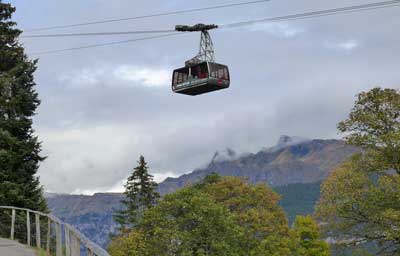
- Schilthorn
- Route: Stechelberg (Lauterbrunnen) to Schilthorn
- Train type: cable car
- Journey time: 1 hour
- 2nd Class fare: CHF108
- Supplement for Swiss Pass holders: 54
- Engelberg to Mt. Titlis cable car
- Route: Engelberg to Mt. Titlis
- Train type: cable car
- 2nd Class fare: CHF96
- Supplement for Swiss Pass holders: 46
The Swiss Travel Pass also includes free museum admission, but…
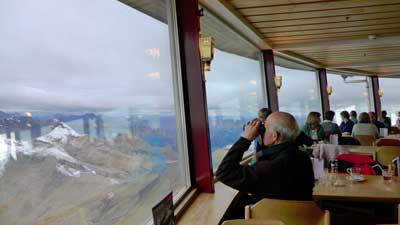
The problem is that the museums are only free on valid travel days, and almost no one would visit more than one or two museums with a Swiss Travel Pass. The trains and cable cars are so expensive that the pass gives very good value to cover those, so you don’t want to waste precious sightseeing time walking through a museum that only costs CHF10 anyway.
In other words, calculate the value of a Swiss Travel Pass on the travel savings only, and if you visit a museum here or there, then great. Most people are better off trying to squeeze in an additional train ride each day, and ignoring the museums. Switzerland is all about the outdoor scenery. As nice as the museums may be, they are not why you are there.
The pass includes free public transport in most Swiss cities
Similar to the free museum part of the offer, it’s best to ignore or minimize the value of free public transportation. It could be helpful in Zurich, but in most other Swiss tourist towns you won’t need much public transport. In fact, in Interlaken, each hotel or hostel guest automatically gets a card for free public transportation within the town (including between the two train stations).
So you might use a ride or two each day on public transport, but that won’t add up to much in terms of value of your Swiss Travel Pass.

Hi Roger,
I am visiting Milano with my family and planning a day trip by taking train from Milano to Tirano and then taking the regional swiss train from Tirano to St Moritz and back on the same day.
Should I get a day pass?
Is there such thing a round trip ticket that is cheaper than single trip ticket?
With the regular ticket, am I allow to hop on and off any stations through this journey?
Appreciate your sharing and thanks in advance
Aaron,
Swiss trains typically have fixed fares so it doesn’t matter when you buy them. It looks like that one will cost CHF32 each way, with no discount for a round-trip. However, when I just checked tickets for a trip a few days from now I saw that they had Supersaver tickets available in both directions, and those were only CHF16 each way. There is no discount for a round-trip, regardless of which day it’s on, but sometimes you can find those Supersaver fares available if the train still hasn’t been booked up much. I don’t think a Day Pass would be worth it even at full price, unless you were doing more things that it covered on that same day.
As for hopping off and hopping on, I think if you pay full price (CHF32 each way) you can do it, but if you get a Supersaver ticket it’s only valid on that particular departure. In other words, full-price tickets in Switzerland are very flexible, but the Supersaver fares are not. Best of luck with this. -Roger
Hi Roger,
Your blogs are very helpful, however I am still unsure where I should visit. I am flying to Basel and I am hoping to stay in Interlaken in November for 3 nights (arriving Friday afternoon and leaving Monday afternoon).
What would you recommend and which pass should I be considering?
Thank you,
Daria
Daria,
Most of my advice on this topic is in the other article on where to stay in Switzerland. It sounds like you might have read that one already. My advice if you only have 3 days would be to focus on the Interlaken area, as you’ve said. Some smaller hotels and restaurants are closed from mid October until mid December because it’s between the main hiking season and the ski season, but there will be places open and the weather should still be nice enough to enjoy.
I’d stay in the Lauterbrunnen Valley for at least two nights if not all three. That means Gimmelwald, Murren, Lauterbrunnen, Wengen, or Grindelwald. All of those are charming towns, and Gimmelwald is actually a tiny farming village that is much smaller than the others. I think the Mountain Hostel is open all year round there, and they have a nice bar and restaurant as well. You could spend one night in Interlaken itself, near one of the train stations, but the majority of the top sights are in and around the Lauterbrunnen Valley. If you can do either Schilthorn or Jungfraujoch (both mentioned in the article) then it would be amazing.
The Half Fare Card is the best option for many visitors, and if you are only staying in the Interlaken area you might also look into the Jungfrau Travel Pass, which is kind of a Swiss Travel Pass that is only valid in that area. It provides free train and bus travel in that area plus a free boat trip and discounts on Schilthorn and Jungfraujoch. The Half Fare Card gets you those discounts, but your train rides and such in that area are only 50% off. It’s hard to say which is the best option for you. Let me know if you have any other questions. -Roger
Dear Roger,
The space is limited, hence I need to do a part 2 of the same questions. Pls refer to part 1 for itenary. More questions I have for you as follows:
B. Lodging
1. Do I use Interlaken as base for 1st & 2nd day. Or stay in Thun / Briens for 1st 2 days ?
2. Pls suggest where I should I base myself & how many days at each base to maximise my trip.
3. I had intended to do 1 night in Lauterbrunen or Gimmelwald at least. Is it possible to sqeeze it in somewhere ?
4. How do swiss hotels operate? Can I leave my bag in the morning 1st & then come later in the evening to check in ? Otherwise, how can I cut short my trip in the afternoon just to check in & go back to continue my travel ?
C. Nightlife / activities
1. What are the available activities in interlaken at night ?I am looking for night skiing / surfing / sledging activities
2. Are the mountains open at night ?
3. Can I come down from Murren to Interlaken & go back same night ? Do the cable car / trains operate at night as well ? What time is the last cable car from interlaken to Murren ?
4. Are there snow activities when I visit during these dates? Can I go taboogan / snow sledge when I visit during this time of the year ?
D. Itienery
1. Pls view my itienery for day 1 & 2. Is it cramming too much ? Should I skip some activities ?
2. I love castles. Do I have sufficient time to visit all 3 castles on day 1? Are they beautiful or can be missed ?
3. On the last day, do I have sufficient time to go from Interlaken to Montreux & then to airport if flight is 5pm
4. Do I have time to do a lake cruise then ?
5. What is best way to go from Montreux to Geneva Air port ?
6. Will there be any train / cable car closure at the mountains when I visit on these dates ?
Thank you for your time & hope to hear from you real soon 🙂
B1. The city of Interlaken itself is kind of cheesy and old fashioned, but it has far more hotel and restaurant choices than anywhere else in the area, plus a bit of nightlife. There’s no right or wrong on this.
B2. It looks like your plan is good in the sense that you are basing yourself in different places so you’ll get the charm of small mountain towns.
B3. That’s up to you. You’ll be going through Lauterbrunnen quite a few times on the trip so you’ll have a chance to see it. And you can see Gimmelwald when you visit Murren.
B4. Yes, any hotel will allow you to put your bag there before you check in or after you check out, for up to a day.
C1. I’m not sure about night adventure activities. I usually like a couple drinks and then dinner. Most people start pretty early there so there isn’t much going on at night.
C2. I’m not sure what you mean, but the cable car up to Gimmelwald and Murren runs until 11pm, I believe. It’s public transportation.
C3. Yes, I believe it runs until 11pm.
C4. The ski season usually runs from mid December until March or April, but there is snow all year round on Jungfrau and some other peaks. My guess is that there isn’t enough snow in October for sledding, but I could be wrong.
D1. Day 2 looks quite busy. I haven’t done all those things so I don’t know how long they will take, but as long as you start early you should be able to do most of them.
D2. I’m not sure. Sorry.
D3. Yes, the trains from those major cities start running around 5am each day and they are famously punctual. There is a station at Geneva Airport so you can easily make it.
D4. I’m not sure. You’ll just have to wing it with some things.
D5. There is a direct train from Montreux to Geneva Airport at 47 minutes past each hour and it takes one hour 10 minutes.
D6. I’m not sure. It’s possible that some of the higher cable cars can be closed at certain times of year for maintenance, but most of the cable cars and trains are public transportation for locals so it’s very rare that those are closed.
Have a great trip. -Roger
Good day Bro Roger,
Firstly thank for you this informative website. I have really learned a lot from you for the past few weeks. I am visiting Interlaken region this saturday 20/10 to next saturday 27/10. Can you please help me with my itenary & questions as follows :
Itenary to Switzerland :
Saturday 20/10
1. Arrive Geneva Airport at 2pm local time
2. Buy Salt Sim card, buy Half Fare Card
3. Take train to Interlaken
4. Buy Jungfrau travel pass (6 days)
5. Spend night in Interlaken hostel using Interlaken as base for next 2 days
Sunday 21/10
1. Start using Jungfrau travel pass
2. Start in Lake Briens – take the lake cruise
3. Take Brienzer Rothorn Railway
4. Come down the railway & continue to Spietz castle & Romanesque church
5. Visit Iseltwald village
6. Across to Lake Thun, cover the medieval town
7. Visit Oberhofen Castle & Thun Castle
Monday 22/10
1. Visit areas in Interlaken
2. Visit Harder Klum
3. Visit Schynigge Platte by cog wheel train
4. Visit Interlaken Monastery & Castle
5. Hohemate Park, Hohewegg,Unterseen
Tuesday 23/10
1. Use Wengen as base for next 2 days
2. Take train all the way to Jungfrau Peak
3. Come down Kleine Scheidegg
4. Spend evening walking in Wengen town
Wednesday 24/10
1. Visit Schiltorn & Piz Gloria
2. Come down to Birg, do the Skyline Walk
3. Explore Wengen town
Thursday 25/10
1. Use Murren as base for next 3 days
2. Visit LauterBrunnen , Gimmelwald
Friday 26/10
1. Spend time in Murren
2. Hiking from Murren to Gimmelwald
3. Winter sports
4. Cover any other area that was missed out in earlier days
Saturday 27/10
1. End of Jungfrau 6 days travel pass & end of travel in Interlaken region
2. Purchase golden pass from Interlaken to Montreux
3. Train / lake Cruise from Montreaux to Geneva city or direct to airport
4. Arrive to Geneva Airport
6. Departure from Geneva airport at 5pm local time
Questions I have for you as follows :
A. Transport
1. Travel from Geneva to Interlaken by using Half fare card, do I need the 1 day travel pass on top of the HFC?
2. Last day travel via Golden pass from Interlaken to Montreux. Similarly,do I need the 1 day travel pass on top of the HFC?
Patrick Raj,
That is a pretty amazing itinerary and it’s clear that you are a very good travel planner. I’ll try to help.
1. The 1-day travel pass might be your best bet because it’ll give you free rides on the local trains and cable cars in the Interlaken area, but if it’s only for that train ride from Geneva I’m not sure if it’s worth it. You’ll just have to check the fares and compare yourself.
2. Same as above. It all comes down to whether that 1-day travel pass with the Half Fare Card is cheaper than just the half fare train ticket itself. Those domestic Swiss train tickets are the same price no matter when you buy them, so you can check the price for any day. And if you get the 1-day pass you’d want to do it very soon because it gets more expensive as the date draws closer.
I’ll answer the others on that comment. -Roger
Hi Roger
I didn’t find this descriptive and detailed anywhere else. We having booked our airbnb in Bern from October20-23. What are the places to visit? Can we plan Interlaken, Mt. Titlis , Jungfrau ? Or will it be too much travel ? And is Swiss pass or Half fare card is better?
Can you help us plan ?
Thanks in Advance
Regards,
Hari
Hari,
I’m happy that you find this helpful. Bern is a lovely and photogenic city that is well located and if you had to stay in a city that would be my choice. Still, I normally recommend people stay in the Interlaken area and in Lucerne for the best access to the sights. You can find the main sites all listed on my article about where to go in Switzerland. You can reach any of those places on a day trip by train, although in some cases it would be two hours each way from Bern and back again.
If you are locked into staying in Bern then I think the Swiss Travel Pass will be your best option since you’ll be riding the trains so much every day. If you can cancel and change to Interlaken and Lucerne then a Half Fare Card might be better value, although it depends on how many of the expensive attractions (and which ones) you’ll be doing. I’m happy to help if you have other questions. -Roger
Hi, Thank you for such an informative blog. I am planning to travel to Switzerland in December this year (12 – 15 December) so I can take in the
scenic trains.
My plan is as follows:
*Day 1: 12 December 2018*
• Fly to Geneva – arrive early morning
• Walk around Geneva
• Take train from Geneva to Montreux
• Overnight at Montreux
*Day 2: 13 December 2018*
• Golden Pass scenic train to Interlaken
• Overnight in Interlaken
*Day 3: 14 December 2018*
• Full day trip to Jungfraujoch
• Train to Zurich
• Overnight in Zurich
*Day 4: 15 December 2018*
• Take the Bernina Express route to Milan
• Overnight in Milan
It would be great if you can:
1) Please let me know if December is a good time to do the above itinerary
2) Is it worthwhile to include Mt Titlis / Mt Pilatus from Lucerne as an additional day experience
3) Would you recommend any other tours / trips as part of this itinerary
3) I plan to buy 4 day Swiss Pass and I can probably just take a regular train ticket for Day 1 from Geneva to Montreux if you advise on any additional days?
SIN,
1) Switzerland is beautiful all year round and December is popular, although the ski season tends to start around 15-December and some smaller hotels and restaurants are closed from mid October until mid December. In other words, your plan is to be there right at the end of the slow season. There are always hotels and restaurants open, especially in the cities, so you’ll be fine.
2) If you can make time for Titlis or Pilatus I think you’d enjoy it. Those are very different from Jungfraujoch.
3) If you have time in Lucerne then the boat trip on the lake for 90 minutes is really enjoyable, and it leaves from right in front of the train station. And while you are in Interlaken I think it would be worthwhile to take the cable car up from Stechelberg up two stops to Murren. After seeing the town a bit you can walk down 15 minutes or so to Gimmelwald and take the cable car one stop down from there. Jungfraujoch is on the other side of the Lauterbrunnen Valley, so the view from Murren is different and really amazing. The cable car up to Murren is only about CHF10 each way, so it’s a cheap and fast way to see a lot.
4) The 4-day Swiss Travel Pass should work well, although it only gets you a 25% discount on Jungfraujoch, which is around CHF200 by itself. If you get the Swiss Travel Pass you might consider instead doing Schilthorn, which is up the cable car above Murren. The views are similar and the hour-long Schilthorn cable car to the revolving restaurants (and included James Bond attraction) is fully covered by the Swiss Travel Pass. If you really prefer Jungfraujoch you might be better off with a Half Fare Card, but you’d need to run the numbers to be sure. Let me know if you have any other questions. -Roger
Would just like to give some feedback on our recent trip this past week from Switzerland, as I found this site really useful (solid work Roger) and would like to add some info to those reading. Great trip, probably top 3 places I have ever been for natural beauty and outdoor stuff to do.
We bought the half fare card for $120CHF each and paid $446 for a moderate amount of travel over 8 days. So we saved $206 CHF for two by going this route. Buying tickets either beforehand via the app or at the station via the ticket counter or electronic kiosk is easy and no delays for us. We did find some significant supersaver fares (50-75% off) that were only available on the SBB app and the day prior, mainly between major city pairs (Zurich-Lucerne, Bern-Zurich). If you use half fare card be sure to make sure you buy the half fare rate online or at kiosk (usually marked by ½ price but not always intuitive). Also be ready to show the half fare proof of purchase (screen shot or paper copy) to ticket check on train. One of the best transportation systems I have seen based on timeliness and ease of use.
Hello Roger, this is really a nice blog. I can plan a good trip now. Me and my wife will be reaching Zurich airport from London on 3rd Oct evening and our return flight back to London from Zurich is on 7th Oct, evening.
Can you please assist us in planning what best we can see in this short period?
Also, please suggest should we buy Swiss travel pass(Half Fare Card ?) or any other travel card?
I’m sorting out the accommodation( from Airbnb) for 5th & 6th night near Lenzburg(to explore Lucerne) and next couple of days near Brenzikofen(to explore Interlaken ). Any suggestions to this please?
Thanks in advance.
Regards,
Sekhar
Sekhar,
You can find all of my best advice on what to do in Switzerland on that article. The Half Fare Card will be good value for you since you are visiting several different areas. A full Swiss Travel Pass may be even better value if you are doing things like the Schilthorn cable car near Interlaken or Mt Rigi cable car and train near Lucerne because those things are fully covered. But if you are mostly going to these places for a look around and a hike, the Half Fare Card is probably your best bet. Let me know if you have any other questions. -Roger
Dear Roger,
Thank you so much for your prompt and very good advice. Will tweak it as we go along then. Good thing you mentioned about the webcams. Will definitely look at them.
Where can I make the reservation for the Glacier Express and Bernina Express? Their website or can I do it at the station?
By the way, I am actually from Malaysia, dropping by at my son’s place in Bath, hence the reason travelling from Bristol airport. For me, I really love the countryside especially the Cotswolds!
Camillia,
I’m also a big fan of Malaysia and KL has become my favorite city in Asia. You can reserve those scenic trains through the individual websites for each train, at least to reserve seats in the panoramic carriages. If you just want to ride the train normally you should be able to buy tickets through sbb.ch or just hop aboard if you have a Swiss Rail Pass. -Roger
Hello Roger,
Thank you so much for providing all the info in your article. It’s super helpful!
I’m travelling to Switzerland in December with my parents (who are seniors, over age 60). Just looking to know what the best option is for a travel pass for our 4 day visit.
Dec 12 – Land in Zurich, travel to Lucerne and stay there for the night.
Dec 13 – Visit sights in Lucerne during the day and depart to Lauterbrunnen in the evening. Night stay in Lauterbrunnen.
Dec 14 – Visit Lauterbrunnen valley, Wengen,Jungfraujoch, Kleine Schedidegg, Grindelwald. Night stay in Lauterbrunnen.
Dec 15 – Departure to Venice, Italy. (from Bern)
Audrey,
It doesn’t look like you’ll be doing enough long train rides or other included attractions to justify a Swiss Travel Pass, so I think the Half Fare Card will be the best option for your trip. It gives you a 50% discount on Jungfraujoch, which almost pays for the Half Fare Card itself, while a Swiss Travel Pass only provides a 25% discount. Have a great trip and let me know if you have any other questions. -Roger